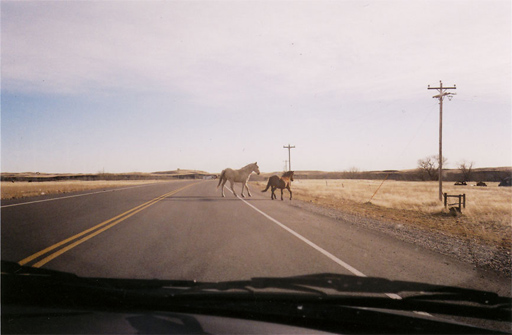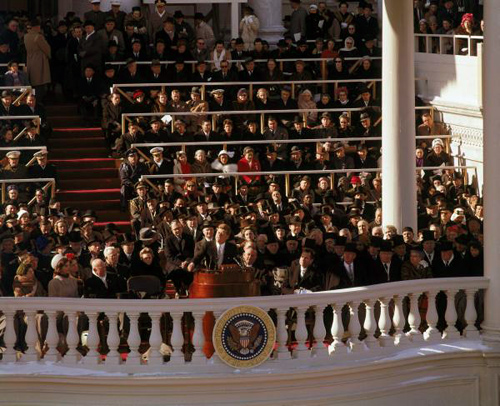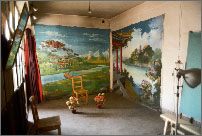January 5, 2009
Juliana Beasley
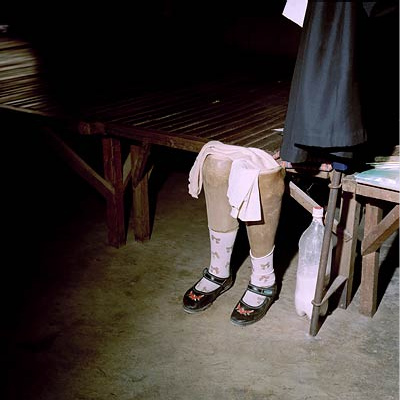
Via my work with 20x200 and Hey Hot Shot I see the portfolios of hundreds if not thousands of photographers, and I'm struck by is how very few photographs—even photographs by very good photographers—are truly memorable. Juliana Beasley has a knack for taking memorable photographs often of subjects who live in the underbelly of society (drunks, strippers, the insane, and the unloved). When I first encountered Beasley's project "Rockaways" a few years ago I think my impression was that the images were striking but that the work showed little compassion for their subjects. But over time the portraits of broken men and hard weary women photographed in harsh light worked their way into my subconscious. I realized my original assessment was completely off base. I mistook her bracing clarity for sarcasm. Many of the images are simply unforgettable. They stick with you. I've since been impressed by the range of Beasley's work and her ability to tell stories most people don't want to hear. She recently started a blog and I'll definitely be following along.
Note: The image above is from Beasley's series on Cambodian land mine victims, it came to mind today while watching this tangentially related but equally courageous story on Cambodian Sex Slavery by Nicholas Kristoff in today's New York Times.
January 7, 2009
Pieter Hugo's Nollywood
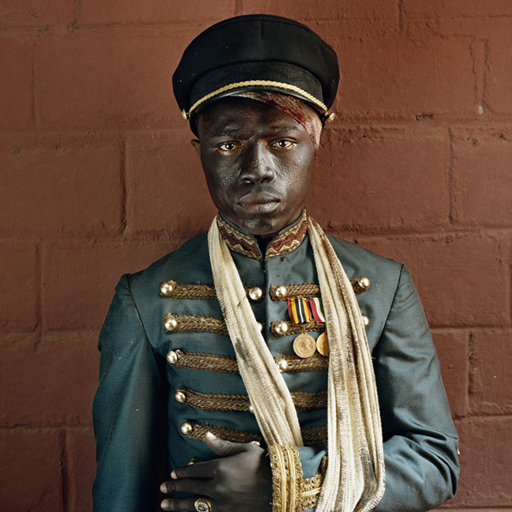
South African photographer Pieter Hugo has produced yet another intriguing punch-you-in-the-gut project titled Nollywood. It's a collection of portraits of actors in the Nigerian Film Industry recreating typical scenes from Nollywood movies which are produced by the thousands often direct to video. I haven't seen many Nollywood films but what I have seen reminds me very much of pulp-filled Mexican cinema of the 60's of the 70's which were filled with stories the extreme and the macabre. I grew up on the Santo series for example in which El Santo a masked hero would battle vampire women, martians, the blue demons, and of course (always) the armies of the undead. There were similarly extreme Mexican westerns, telenovelas (soaps), musicals, and science fiction. All were making movie magic and capturing the popular imagination of millions of people with the slimmest of budgets and improvised props. These were not mainstream films, but rather pulp shown on late night TV and later distributed by video. The pulp Nollywood films I've seen are similar. If you had undertaken an analogous photography project in Mexico 30 years ago you would have ended up with many similar archetypes— images influenced by Western cinema, but made uniquely local and encoded with popular mythologies.
Pieter's work also always brings up questions of race, identity, and of the photographer's gaze and this project like so many of his projects provokes questions, demands attention, and is at once intriguing, maddening, and exhilarating.
Related: Stefan Ruiz and Pieter Hugo worked together at Colors Magazine for a few years and intentionally or not they seem to influence each other. Check out Stefan's project called Telenovelas in which photographs the stars of telenovelas on the Mexico City sets of their shows.
January 14, 2009
Gabriel at Night
My son Gabriel who is 22 months old had growing pains last night. At some ungodly hour he started, began moaning, and then sobbing loudly. When we asked what was wrong he simply cried "hurts" and pointed down at his legs, a much simpler and direct diagnosis than is found in medical literature which describes these pains as "non-inflammatory musculoskeletal pain syndromes, non-articular, inter-mittent bilateral aches" (but so far provides no clues as to why they occur).
Holding Gabriel's legs tight made him feel better; his moans dissolved into whimpers, and he faded back into sleep. When we would let go of his his legs, even in slumber, he would guide our hands back. I have foggy memories of my own growing pains and I have no idea if someone held my legs, but I distinctly felt the rush of sense memory so I think it must have happened. And in those half remembered moments in the middle of the night you also get the impression that this memory will be passed on through some subterranean reptilian channel. And I wonder which is the deeper comfort: knowing on some primitive level that someone is there to hold your legs at night when they hurt, or being the person who was able to be there?
January 14, 2009
Patrick O'Dell
One of the great pleasures in life is jumping into a car and just driving for a couple of days or weeks with no particular destination in mind.
I don't know the story behind Patrick O'Dell's Natives (shot for Vice Magazine), but I'm guessing he hopped into a car and ended up on a reservation somewhere way out west. Feels exactly right and I like it because of that.
The rest of the portfolio can be found here.
January 19, 2009
Christian Chaize
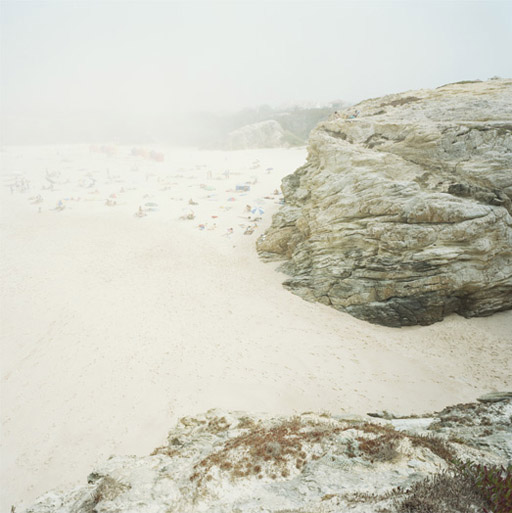
We're featuring the Lyon based, Portuguese photographer Christian Chaize on 20x200 in the next few weeks. I can pre-announce because the cat's already out of the bag (Our Chaize image, not the one above, was featured in the Febrary Domino magazine). Chaize's images have an easy appeal, are also interesting studies on time and group dynamics, and are the perfect antidote to a cold winter's night.
January 20, 2009
Inaugural Addresses Past
Here are the full texts of all the inaugural addresses past.
And a few snippets that stuck out for me (in no particular order):
Lyndon Johnson:
"My fellow countrymen, on this occasion, the oath I have taken before you and before God is not mine alone, but ours together. We are one nation and one people. Our fate as a nation and our future as a people rest not upon one citizen, but upon all citizens.This is the majesty and the meaning of this moment.
For every generation, there is a destiny. For some, history decides. For this generation, the choice must be our own.
Even now, a rocket moves toward Mars. It reminds us that the world will not be the same for our children, or even for ourselves in a short span of years. The next man to stand here will look out on a scene different from our own, because ours is a time of change—rapid and fantastic change bearing the secrets of nature, multiplying the nations, placing in uncertain hands new weapons for mastery and destruction, shaking old values, and uprooting old ways.
Our destiny in the midst of change will rest on the unchanged character of our people, and on their faith." (video)
Teddy Roosevelt:
" Yet, after all, though the problems are new, though the tasks set before us differ from the tasks set before our fathers who founded and preserved this Republic, the spirit in which these tasks must be undertaken and these problems faced, if our duty is to be well done, remains essentially unchanged. We know that self-government is difficult. We know that no people needs such high traits of character as that people which seeks to govern its affairs aright through the freely expressed will of the freemen who compose it. But we have faith that we shall not prove false to the memories of the men of the mighty past. They did their work, they left us the splendid heritage we now enjoy. We in our turn have an assured confidence that we shall be able to leave this heritage unwasted and enlarged to our children and our children's children. To do so we must show, not merely in great crises, but in the everyday affairs of life, the qualities of practical intelligence, of courage, of hardihood, and endurance, and above all the power of devotion to a lofty ideal, which made great the men who founded this Republic in the days of Washington, which made great the men who preserved this Republic in the days of Abraham Lincoln."
Woodrow Wilson
We are provincials no longer. The tragic events of the thirty months of vital turmoil through which we have just passed have made us citizens of the world. There can be no turning back. Our own fortunes as a nation are involved whether we would have it so or not.And yet we are not the less Americans on that account. We shall be the more American if we but remain true to the principles in which we have been bred. They are not the principles of a province or of a single continent. We have known and boasted all along that they were the principles of a liberated mankind. These, therefore, are the things we shall stand for, whether in war or in peace.
Harry Truman
The American people stand firm in the faith which has inspired this Nation from the beginning. We believe that all men have a right to equal justice under law and equal opportunity to share in the common good. We believe that all men have the right to freedom of thought and expression. We believe that all men are created equal because they are created in the image of God.From this faith we will not be moved.
Howard Taft
The negroes are now Americans. Their ancestors came here years ago against their will, and this is their only country and their only flag. They have shown themselves anxious to live for it and to die for it. Encountering the race feeling against them, subjected at times to cruel injustice growing out of it, they may well have our profound sympathy and aid in the struggle they are making. We are charged with the sacred duty of making their path as smooth and easy as we can. Any recognition of their distinguished men, any appointment to office from among their number, is properly taken as an encouragement and an appreciation of their progress, and this just policy should be pursued when suitable occasion offers.
Grover Cleveland
Care for the property of the nation and for the needs of future settlers requires that the public domain should be protected from purloining schemes and unlawful occupation.The conscience of the people demands that the Indians within our boundaries shall be fairly and honestly treated as wards of the Government and their education and civilization promoted with a view to their ultimate citizenship, and that polygamy in the Territories, destructive of the family relation and offensive to the moral sense of the civilized world, shall be repressed.
The laws should be rigidly enforced which prohibit the immigration of a servile class to compete with American labor, with no intention of acquiring citizenship, and bringing with them and retaining habits and customs repugnant to our civilization.
John F Kennedy (full speech) (mp3)
Dwight D. Eisenhower (full speech)
FDR's First Innagural (mp3)
John Adams
There may be little solidity in an ancient idea that congregations of men into cities and nations are the most pleasing objects in the sight of superior intelligences, but this is very certain, that to a benevolent human mind there can be no spectacle presented by any nation more pleasing, more noble, majestic, or august, than an assembly like that which has so often been seen in this and the other Chamber of Congress, of a Government in which the Executive authority, as well as that of all the branches of the Legislature, are exercised by citizens selected at regular periods by their neighbors to make and execute laws for the general good. Can anything essential, anything more than mere ornament and decoration, be added to this by robes and diamonds? Can authority be more amiable and respectable when it descends from accidents or institutions established in remote antiquity than when it springs fresh from the hearts and judgments of an honest and enlightened people? For it is the people only that are represented. It is their power and majesty that is reflected, and only for their good, in every legitimate government, under whatever form it may appear. The existence of such a government as ours for any length of time is a full proof of a general dissemination of knowledge and virtue throughout the whole body of the people. And what object or consideration more pleasing than this can be presented to the human mind? If national pride is ever justifiable or excusable it is when it springs, not from power or riches, grandeur or glory, but from conviction of national innocence, information, and benevolence.
January 21, 2009
Jan 20th, 2009
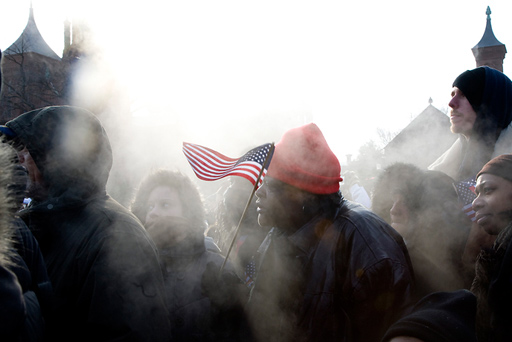
I was looking around for a picture that summarized the inauguration for me when as if by telekinesis I received an email from photographer Rachel Feierman with the above image attached. I hope she posts more from the inauguration in her Politics series...
Related: Rachel Hope Feierman
January 27, 2009
Tomokyo Yoneda
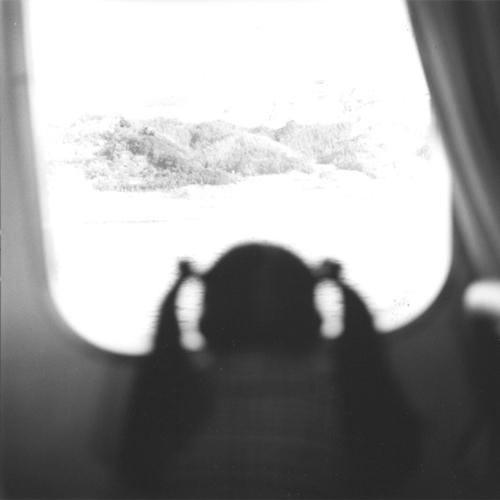
Tomoko Yoneda is a Japanese photographer based in London whose books I've been studying lately. I'm intrigued by her quiet photos that reveal histories hidden in plain sight. In one portfolio she shoots the locations of foreign spy rendezvous, in another she documents the indirect impressions we make on houses (discolorations from radiator heat for example), and in another she photographs banal landscapes that were the scenes of battles and historical events (a pretty sea view at night turns out to be the location where Dr. Mengele drown himself for example). Her portfolios are little puzzle poems, and reminders that we are all surrounded by ghosts.
More on Yoneda: Deutsche Bank Art Magazine, Japan Times
January 28, 2009
Are you Arabic?
Twenty two years ago I was sitting in an empty dining car on a train from Princeton, New Jersey to Washington D.C., when a girl who I did not know slid into the seat across the table from me. I thought she must have mistaken me for a friend by the familiar way she bounded over. She was a few years older than me, preppy, and carried a copy of the New Yorker magazine with a man walking his dog in the snow on the cover. She smelled of vanilla. It was twilight out, a heavy snow was falling, and without looking at me she said, "I hate snow," to which I eventually answered, "Oh... How sad." She turned from the window looking at me carefully, pursed her lips, and began reading her magazine. I continued looking out the window. We sat there in silence for the good part of an hour and then she abruptly rose and said, "You will remember me," and left. I never saw her again.
I remember the sound of the train, the snow swirling by, and the color of the sky which turned from lapis to midnight. I remember I was wearing a plaid shirt with a missing button under my father's overcoat and I remember in my pocket I was carrying a polaroid picture of a lady in black carrying a black umbrella in the snow. I remember the blackwatch scarf the girl wore draped around her neck, cashmere probably, and I remember that smell of vanilla, but I couldn't tell you a single thing about her face, her voice, or even the color of her hair. So, if by some strange fate, you happen to read this girl on the train: "No. It turns out I haven't remembered you, you have flickered away."
